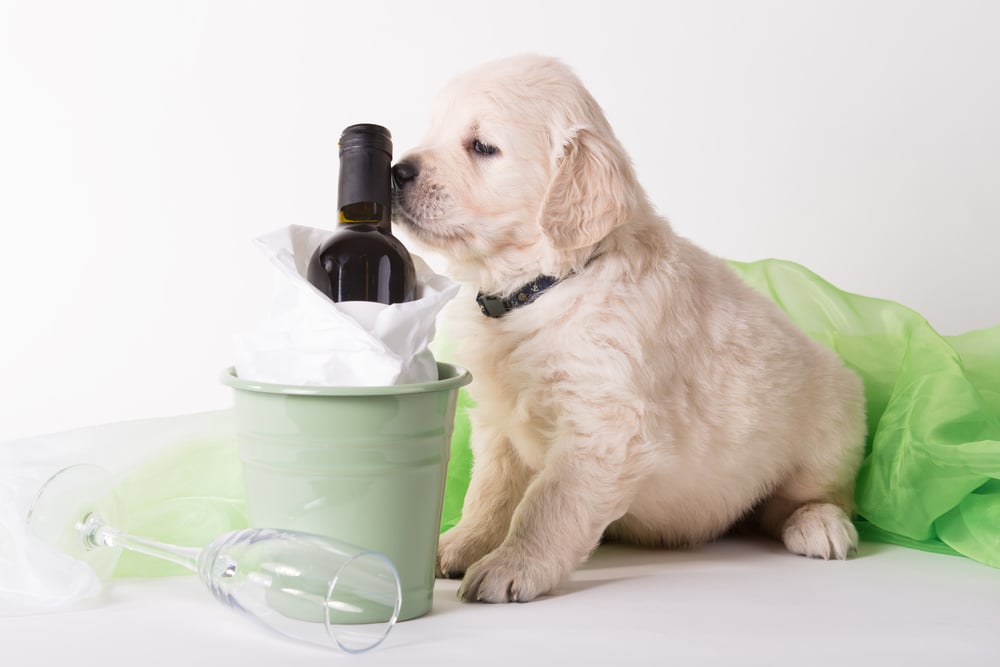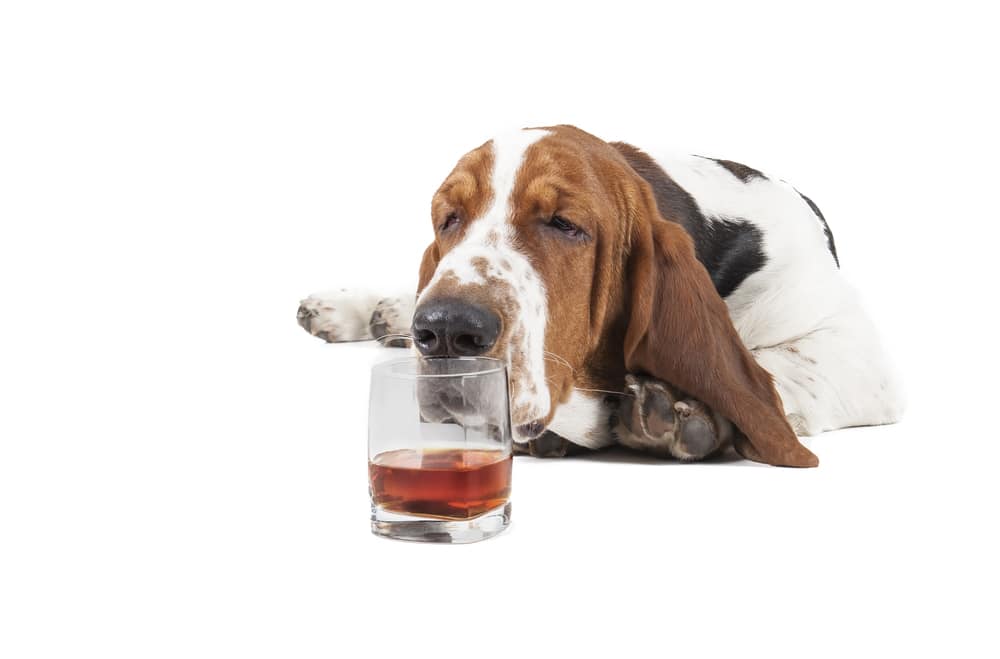There are many good reasons why dog products should not contain alcohol. All of them have to do with the fact that alcohol is dangerous if ingested by dogs. So, what are all these reasons why dog products should not contain alcohol?
Dog products should never contain alcohol because alcohol can seriously harm and even kill your dog. Alcoholic beverages and food products containing alcohol can cause symptoms such as staggering, becoming uncoordinated, depression, more urination, more thirst, lower body temperature, vomiting, excessive drooling, diarrhea, abnormal blood acidity, breathing difficulty, lower energy, seizures, and even death. If you suspect your pet has ingested alcohol, contact your veterinarian immediately.
Table of Contents
What Happens If My Dog Ingests Alcohol?

Firstly, alcohol toxicity is a common form of pet poisoning that can occur from ingestion, skin absorption, or inhalation of alcohol or products that contain alcohol. Secondly, alcohol poisoning primarily affects a pet’s gastrointestinal (GI) system, respiratory system, central nervous system, and heart.
With a dog, alcohol and products that contain alcohol can cause many symptoms (more on those below) and even death.
Alcohols are depressants, so many of the clinical signs associated with them are due to their effect on the central nervous system (CNS). Alcohols irritate the gastrointestinal tract. They also act as diuretics, and the alcohol and its metabolites are eliminated by the kidneys. Liver damage may occur after exposure, although it is much more common in animals that have repeated or chronic exposure.
What Are The Symptoms Of Alcohol Poisoning In Dogs?
Signs of alcohol toxicity vary in severity and are dependent on the type of alcohol ingested, the amount, and the pet’s size. Here are some signs of alcohol toxicity to look for if you think a dog may have ingested a product that might contain alcohol:
- Staggering around
- Vomiting
- Becoming uncoordinated
- Drooling too much
- Diarrhea
- More thirsty
- Urinating more
- Depression
- Abnormal blood acidity
- Trouble breathing
- Low body temperature
- Loss of energy
- Abnormal heartbeat
- Seizures
How Can Alcohol Poisoning Be Diagnosed And Treated In Dogs?
You must bring your dog in for immediate veterinary care if you observe them ingesting or being exposed to alcohol or a product that might contain alcohol because some pets will not show immediate signs of poisoning. An alcohol toxicity diagnosis is based on a pet’s history of ingestion or contact with alcohol and clinical signs. But if your veterinarian is not available, try an emergency vet (sometimes your vet will list emergency vet contact information on their site) or animal poison control.
Your veterinarian may induce your pet to vomit if the ingestion has occurred recently, but you should never induce vomiting unless directed to do so by a veterinarian. Your veterinarian may recommend blood work to monitor your pet’s overall organ health. Also, poisoned dogs will require an extended hospital stay for emergency care, treatment, and continued observation which may include:
- Body temperature monitoring and regulation with specialized warming pads
- Heart rate and blood pressure monitoring
- Oxygen therapy
- Intravenous (IV) fluids to prevent dehydration and electrolyte imbalances
- IV dextrose for low blood sugar
- Liver-protecting medications
- Anti-nausea medication
- Gastroprotectant medication
- Anti-seizure medication
How To Prevent Alcohol Poisoning In Dogs?
Keeping any alcoholic beverages or products containing alcohol out of your pet’s reach is the best way to prevent them from being accidentally poisoned. Never feed your pet any desserts or drinks that contain alcohol because even a small amount can be dangerous.
Do Certain Dogs React Differently To Products That Contain Alcohol?
All poisoning problems boil down to the amount of alcohol ingested compared to weight, just like a dose of medicine. Moreover, every dog has the same reaction to ingesting alcohol, there is no difference in the type of dog. The only difference is when they took a different amount of alcohol. So, if they have ingested a big amount of alcohol the signs of toxicity would be faster and fatal for them. And if the dog is a small breed, it would be more dangerous too.
Puppies are at particular risk because of their small size and immature organ systems.
What About Samoyeds?
So, like any other dog, even Samoyeds have the same reactions from the digestion of products that contain alcohol.
Samoyed and other dogs are highly susceptible to the effects of alcohol. Within 15 to 30 minutes after the pet has drunk the alcohol on an empty stomach (or within 1 to 2 hours on a full stomach), central nervous system (CNS) signs, such as staggering, excitement, or decreased reflexes, can begin. Behavior changes can be seen, as can an increased need to pee. As the problem gets worse, the pet may become depressed, have a slow breathing rate, or go into cardiac arrest.
In Conclusion: Why Dog Products Should Not Contain Alcohol
So, it turns out, that dog products should not contain any amount of alcohol. The reason why dog products should not contain alcohol is that it’s so harmful to dogs. So, dog owners need to be careful with their alcohol in the apartment and to be informed about the product that they offer to their dogs.
So, when reading this article, what did you learn? Let us know your thoughts in the comments below!
